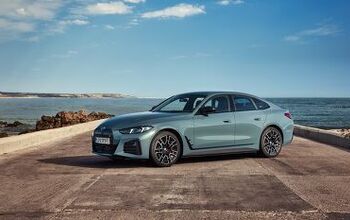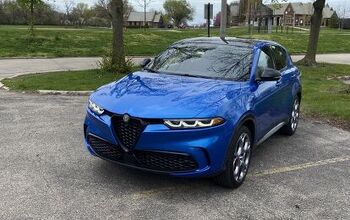QOTD: Out With the Old, In With a Funky New Name?

In the cinematic classic National Lampoon’s Loaded Weapon 1, screen legend Kathy Ireland’s character is asked, under intense police questioning, whether she knows the traitorous General Mortars.
“Well, I drive a Buick,” she responds.
See? This proves the name General Motors confuses people. All the more reason to throw out that dusty moniker and write a new script.
You might be thinking right now that your author has dipped too deeply into the sauce, but that’s only half true. If you weren’t aware, much hilarity ensued yesterday after Morgan Stanley analyst Adam Jonas, during an earnings call, asked GM CEO Mary Barra if the automaker has ever considered changing its name to reflect its current electric vehicle push. In Wednesday’s second-quarter earnings report, GM pledged not to retreat from its pre-virus product plan, claiming the timeline hasn’t changed.
The EV tsunami is already headed for an idyllic shore near you. Powering those vehicles will be proprietary Ultium batteries assembled at a massive facility currently under construction in Lordstown, Ohio.
“The General Motors brand has done its job, but I’m wondering if it might be out of touch with some of the really interesting directions you’re taking the business,” Jonas said. “Why not call the company Ultium, the entire company?”
Probably not the question Barra was expecting to have to answer. But answer it she did, making sure to come across as open-minded yet non-committal.
“We are open to looking at … anything that we think is going to drive long-term shareholder value,” Barra said. “We believe strongly in our EV future.”
Jokes immediately flashed across the Twitter box from humor muscles already exercised by the recent announcement that merger partners Fiat Chrysler and Groupe PSA will wear the name Stellantis in the near future.
Old Detroit 3: GM, Chrysler and Ford
— Nick Bunkley (@nickbunkley) July 29, 2020
Yes, the name General Motors dates back to an era where wax cylinder records were competing with 78 rpm phonograph discs for home music supremacy. Everyone knows what it is — or perhaps more specifically, what it was. It was the creator of Corvette and Camaro, of Silverado and Suburban.
Of Cavalier and Cimarron. Vega and Citation.
Of those cars your dad or mom or uncle said they’d never buy anymore, implanting a lasting stigma in your developing brain.
Ultium power is the automaker’s proclaimed future, though lucrative gas-powered trucks and SUVs will stick around, probably for a good long while, to fund the whole works. There can be benefit in a rebranding, but it comes with no shortage of risk. The risk of erasing a century-plus of name recognition and the heritage that comes with.
So, let’s have it. Would a name change do GM any good, or is this the stupidest thing you’ve heard of since KFC introduced the Double Down? What name would you give GM?

More by Steph Willems
Latest Car Reviews
Read moreLatest Product Reviews
Read moreRecent Comments
- Pau65792686 I think there is a need for more sedans. Some people would rather drive a car over SUV’s or CUV’s. If Honda and Toyota can do it why not American brands. We need more affordable sedans.
- Tassos Obsolete relic is NOT a used car.It might have attracted some buyers in ITS DAY, 1985, 40 years ago, but NOT today, unless you are a damned fool.
- Stan Reither Jr. Part throttle efficiency was mentioned earlier in a postThis type of reciprocating engine opens the door to achieve(slightly) variable stroke which would provide variable mechanical compression ratio adjustments for high vacuum (light load) or boost(power) conditions IMO
- Joe65688619 Keep in mind some of these suppliers are not just supplying parts, but assembled components (easy example is transmissions). But there are far more, and the more they are electronically connected and integrated with rest of the platform the more complex to design, engineer, and manufacture. Most contract manufacturers don't make a lot of money in the design and engineering space because their customers to that. Commodity components can be sourced anywhere, but there are only a handful of contract manufacturers (usually diversified companies that build all kinds of stuff for other brands) can engineer and build the more complex components, especially with electronics. Every single new car I've purchased in the last few years has had some sort of electronic component issue: Infinti (battery drain caused by software bug and poorly grounded wires), Acura (radio hiss, pops, burps, dash and infotainment screens occasionally throw errors and the ignition must be killed to reboot them, voice nav, whether using the car's system or CarPlay can't seem to make up its mind as to which speakers to use and how loud, even using the same app on the same trip - I almost jumped in my seat once), GMC drivetrain EMF causing a whine in the speakers that even when "off" that phased with engine RPM), Nissan (didn't have issues until 120K miles, but occassionally blew fuses for interior components - likely not a manufacturing defect other than a short developed somewhere, but on a high-mileage car that was mechanically sound was too expensive to fix (a lot of trial and error and tracing connections = labor costs). What I suspect will happen is that only the largest commodity suppliers that can really leverage their supply chain will remain, and for the more complex components (think bumper assemblies or the electronics for them supporting all kinds of sensors) will likley consolidate to a handful of manufacturers who may eventually specialize in what they produce. This is part of the reason why seemingly minor crashes cost so much - an auto brand does nst have the parts on hand to replace an integrated sensor , nor the expertice as they never built them, but bought them). And their suppliers, in attempt to cut costs, build them in way that is cheap to manufacture (not necessarily poorly bulit) but difficult to replace without swapping entire assemblies or units).I've love to see an article on repair costs and how those are impacting insurance rates. You almost need gap insurance now because of how quickly cars depreciate yet remain expensive to fix (orders more to originally build, in some cases). No way I would buy a CyberTruck - don't want one, but if I did, this would stop me. And it's not just EVs.
- Joe65688619 I agree there should be more sedans, but recognize the trend. There's still a market for performance oriented-drivers. IMHO a low budget sedan will always be outsold by a low budget SUV. But a sports sedan, or a well executed mid-level sedan (the Accord and Camry) work. Smaller market for large sedans except I think for an older population. What I'm hoping to see is some consolidation across brands - the TLX for example is not selling well, but if it was offered only in the up-level configurations it would not be competing with it's Honda sibling. I know that makes the market smaller and niche, but that was the original purpose of the "luxury" brands - badge-engineering an existing platform at a relatively lower cost than a different car and sell it with a higher margin for buyers willing and able to pay for them. Also creates some "brand cachet." But smart buyers know that simple badging and slightly better interiors are usually not worth the cost. Put the innovative tech in the higher-end brands first, differentiate they drivetrain so it's "better" (the RDX sells well for Acura, same motor and tranmission, added turbo which makes a notable difference compared to the CRV). The sedan in many Western European countries is the "family car" as opposed to micro and compact crossovers (which still sell big, but can usually seat no more than a compact sedan).


































Comments
Join the conversation
@Vulpine--Agree with towing with a turbo. I would rather not buy a turbo engine but I understand why the manufacturers are making them and why some like them. Turbo engines, double clutch automatic transmissions, and CVTs are things I avoid on any vehicle.
GM has already thrown away too many nameplates as it is. General Motors refers to the amalgam of makes it absorbed into its growing corporate concern about 100 years ago. Even if the numbers have ebbed and flowed (much as during the Depression), it is a legacy, whatever mixed feelings it elicits from customers in the marketplace. I echo similar comments about William Durant's name being nearly lost to history. It is a shame; I can barely source a decent book on the man.